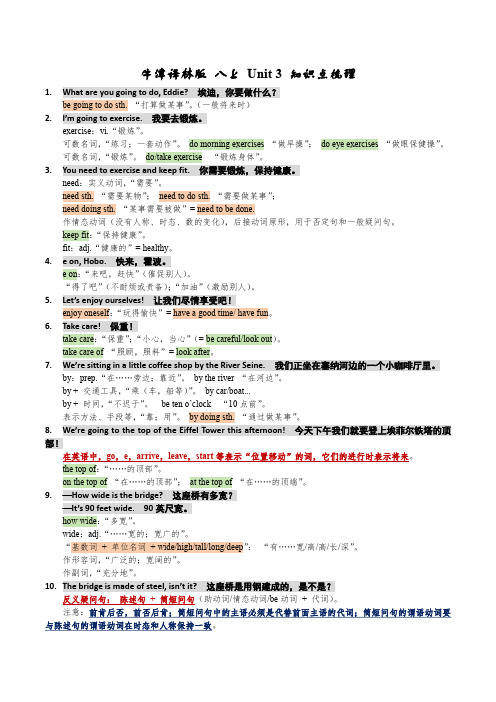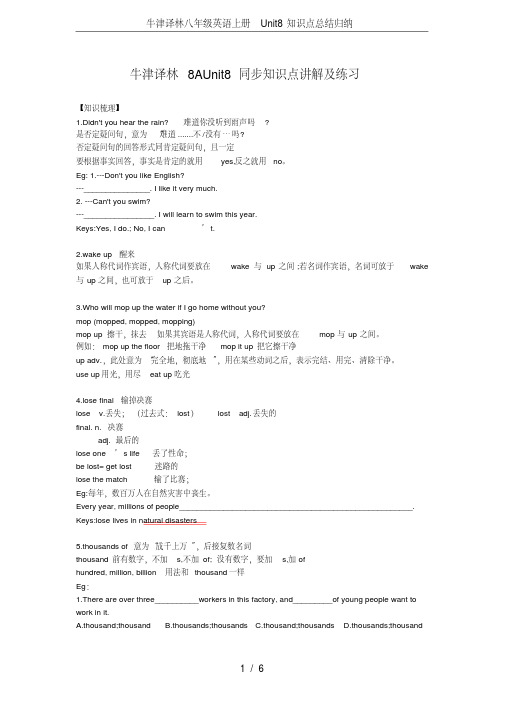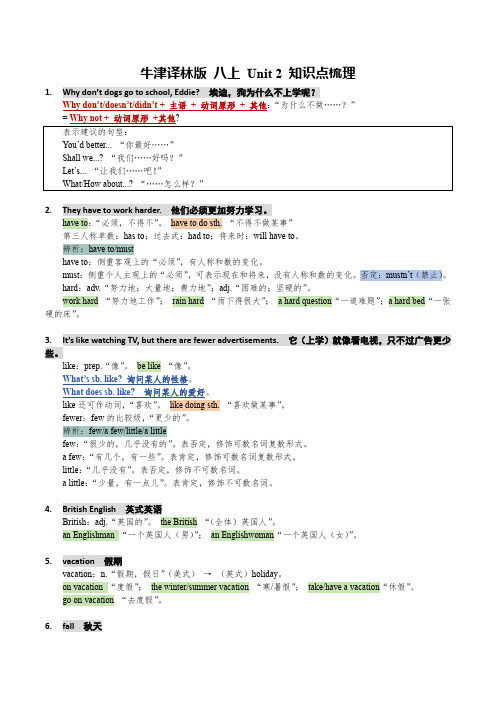牛津译林版八年级上英语知识点总结
牛津译林版八年级英语全册语法知识点总结

1.句子结构:a.主语+谓语+宾语b.主语+谓语+间接宾语+直接宾语c.主语+谓语+宾语+宾语补足语d.主语+谓语+宾语+宾语补足语+定语e.主语+系动词+表语f.主语+不及物动词2.时态:a.一般现在时:表示现在经常性、习惯性的动作或状态。
b.现在进行时:表示现在正在进行的动作。
c.一般过去时:表示过去发生的动作或状态。
d.过去进行时:表示过去其中一时刻正在进行的动作。
e.一般将来时:表示将来的动作或状态。
f.将来进行时:表示将来其中一时刻正在进行的动作。
3.语态:a.主动语态:主语是动作的执行者。
b.被动语态:主语是动作的承受者。
4.动词时态和语态的被动形式:a. 一般现在时的被动形式:am/is/are+动词的过去分词。
b. 一般过去时的被动形式:was/were+动词的过去分词。
c. 将来时的被动形式:will be+动词的过去分词。
d. 现在进行时的被动形式:am/is/are+being+动词的过去分词。
e. 过去进行时的被动形式:was/were+being+动词的过去分词。
5.情态动词:a. can:表示能力、允许和请求。
b. may:表示许可、可能性和祝愿。
c. must:表示肯定、必要性和推测。
d. should:表示建议、责任和承诺。
e. might:表示推测、可能和祝愿。
f. would:表示假设、请求和习惯。
6.虚拟语气:a.虚拟语气用于表达虚构、假设、愿望、建议等。
b. 虚拟语气主要涉及以下几个时态:一般过去时、现在将来时、与现在相对的过去将来时、would/could+动词原形。
7.上文一致性:a.当主句用一般现在时态表述,宾语从句中的谓语动词将会保持不变。
b.当主句用过去时态表述,宾语从句中的谓语动词将用相应的过去时态。
总结完毕,以上是牛津译林版八年级英语全册所涉及的主要语法知识点。
Unit3知识点梳理牛津译林版英语八年级上册

牛津译林版八上Unit 3 知识点梳理1.What are you going to do, Eddie? 埃迪,你要做什么?be going to do sth. “打算做某事”。
(一般将来时)2.I’m going to exercise. 我要去锻炼。
exercise:vi.“锻炼”。
可数名词,“练习;一套动作”。
do morning exercises “做早操”;do eye exercises “做眼保健操”。
可数名词,“锻炼”。
do/take exercise “锻炼身体”。
3.You need to exercise and keep fit. 你需要锻炼,保持健康。
need:实义动词,“需要”。
need sth. “需要某物”;need to do sth. “需要做某事”;need doing sth. “某事需要被做”= need to be done.作情态动词(没有人称、时态、数的变化),后接动词原形,用于否定句和一般疑问句。
keep fit:“保持健康”。
fit:adj.“健康的”= healthy。
4. e on, Hobo. 快来,霍波。
e on:“来吧,赶快”(催促别人)。
“得了吧”(不耐烦或责备);“加油”(激励别人)。
5.Let’s enjoy ourselves! 让我们尽情享受吧!enjoy oneself:“玩得愉快”= have a good time/ have fun。
6.Take care! 保重!take care:“保重”;“小心,当心”(= be careful/look out)。
take care of “照顾,照料”= look after。
7.We’re sitting in a little coffee shop by the River Seine. 我们正坐在塞纳河边的一个小咖啡厅里。
by:prep.“在……旁边;靠近”。
牛津译林八年级英语上册Unit8知识点总结归纳

牛津译林8AUnit8同步知识点讲解及练习【知识梳理】1.Didn't you hear the rain? 难道你没听到雨声吗?是否定疑问句,意为“难道.......不/没有…吗?否定疑问句的回答形式同肯定疑问句,且一定要根据事实回答,事实是肯定的就用yes,反之就用no。
Eg: 1.---Don't you like English?---_______________. I like it very much.2. ---Can't you swim?---________________. I will learn to swim this year.Keys:Yes, I do.; No, I can’t.2.wake up 醒来如果人称代词作宾语,人称代词要放在wake与up之间;若名词作宾语,名词可放于wake 与up之间,也可放于up之后。
3.Who will mop up the water if I go home without you?mop (mopped, mopped, mopping)mop up 擦干,抹去如果其宾语是人称代词,人称代词要放在mop与up之间。
例如:mop up the floor 把地拖干净mop it up把它擦干净up adv.,此处意为“完全地,彻底地”,用在某些动词之后,表示完结、用完、清除干净。
use up用光,用尽 eat up吃光4.lose final 输掉决赛lose v.丢失;(过去式:lost)lost adj.丢失的final. n. 决赛adj. 最后的lose one’s life 丢了性命;be lost= get lost 迷路的lose the match 输了比赛;Eg:每年,数百万人在自然灾害中丧生。
Every year, millions of people_____________________________________________________. Keys:lose lives in natural disasters5.thousands of意为“成千上万”,后接复数名词thousand 前有数字,不加s,不加of; 没有数字,要加s,加ofhundred, million, billion用法和thousand一样Eg:1.There are over three__________workers in this factory, and_________of young people want to work in it.A.thousand;thousandB.thousands;thousandsC.thousand;thousandsD.thousands;thousand2.______students went to the university to listen to the_____ speech.A.Thousand of;120-minutesB.Thousands of;120-minutesC. Two thousands: 120- minutesD. Two thousand; 120-minuteKeys:C;D6.wash away 冲走如果人称代词作宾语,人称代词要放在wash与away之间;若名词作宾语,名词可放于wash 与away之间,也可放于away之后。
Unit2知识点梳理牛津译林版八年级英语上册

牛津译林版八上Unit 2 知识点梳理1.Why don’t dogs go to school, Eddie? 埃迪,狗为什么不上学呢?Why don’t/doesn’t/didn’t + 主语+ 动词原形+ 其他:“为什么不做……?”2.They have to work harder. 他们必须更加努力学习。
have to:“必须,不得不”。
have to do sth. “不得不做某事”第三人称单数:has to;过去式:had to;将来时:will have to。
辨析:have to/musthave to:侧重客观上的“必须”,有人称和数的变化。
must:侧重个人主观上的“必须”,可表示现在和将来,没有人称和数的变化。
否定:mustn’t(禁止)。
hard:adv.“努力地;大量地;费力地”;adj.“困难的;坚硬的”。
work hard “努力地工作”;rain hard “雨下得很大”;a hard question“一道难题”;a hard bed“一张硬的床”。
3.It’s like watching TV, but there are fewer advertisements. 它(上学)就像看电视,只不过广告更少些。
like:prep.“像”。
be like “像”。
What’s sb. like? 询问某人的性格。
“喜欢做某事”。
fewer:few的比较级,“更少的”。
辨析:few/a few/little/a littlefew:“很少的,几乎没有的”。
表否定,修饰可数名词复数形式。
a few:“有几个,有一些”。
表肯定,修饰可数名词复数形式。
little:“几乎没有”。
表否定,修饰不可数名词。
a little:“少量,有一点儿”。
表肯定,修饰不可数名词。
4.British English 英式英语British:adj.“英国的”。
the British “(全体)英国人”。
Module1考点汇总牛津译林版八年级英语上册

第一单元考点集合1.care 的用法5.maybe和may be7. 动词share的用法14.than 表比较和more构成的比较级的用法。
20.形容词比较级、最高级的用法一、形容词、副词比较级和最高级的构成方法形容词比较级和最高级的构成方法:不规则变化二、形容词副词比较级的用法1) “比较级+and+比较级”表示“越来越……”。
2) 表示“越…,就越…”,用“the+比较级,the+比较级….”3)比较级前面可以加上much, a little, even, a lot,等词.4)“the more…of the two…”表示“两个当中较……的一个”三、形容词副词最高级的用法1)the +最高级+of/ in …2) …A, B or C? Which do you best, blue, red or whit e?3) “one of +最高级+复数名词”:注意:在形容词最高级前有限定词时,不要定冠词the.同时形容词最高级前要加the,但是副词最高级the可省。
4)the +序数词+最高级+名词单数比较级专练一、单项选择1.The Yangtze River is ________ than any other river in China.A.long B.longer C.longest D.the longest 2.—What do you think of the TV play Tiger Mom directed by Yao Xiaofeng?—Wonderful! I think it’s ________ than the other TV plays about education in the recent years.A.the best B.the worst C.much better D.much worst 3.—Eileen Gu won two gold medals for China in the Winter Olympic Games in Beijing.—Her success comes from hard work. The harder you work, ________ you will be. A.lucky B.the luckier C.luckier4.—Who do you like best in our club?—Nancy, because she is ________ than others.A.clever B.much clever C.much more clever D.the cleverest 5.The ________ kids learn to be independent, the ________ it is for their future. A.early; good B.earlier; better C.earliest; best6.This film is _____ interesting than that one.A.much B.too much C.much too D.much more 7.— Which is _____ city, Shanghai or Beijing? —I have no idea.A.big B.bigger C.the bigger D.the biggest 8.—Could you tell me why you learn English so well?—It’s very simple. ______ you study, ______ grades you will get.A.The harder; better B.Harder; betterC.Harder; the better D.The harder; the better9.The number of giant pandas is getting ______ because their living areas are becoming farmland.A.less and less B.larger and largerC.smaller and smaller D.more and more10.— China is over 5,000 years old. It’s one of ______ countries in the world.— Yes. It has a much ______ history than the USA.A.old; long B.older; longerC.older; the longest D.the oldest; longer二、适当形式填空1.Amy is the __________ (slim) girl in our class.2.He is __________ (quiet) boy in my class. He almost never talks.3.As we all know, summer is the ________ (hot) season in China. 4.Climbing is one of the most ________ (danger) sports in the world. 5.That movie is ________ (bad) that I have ever seen.6.Monday is my_________ (busy) day in a week.7.I think it' s too expensive. I' d like a________ (cheap) one.8.Mr. Lin is ____________(friendly) than Mr. Wang9.He is one of the most excellent _________(swim) in China.10.Our classroom is much _________ (tidy) than theirs.课后习题一、完型填空Everyone needs friends. We all like to __1___ close to someone. It is nice to have a friend to talk, laugh and do things with. ___2___, sometimes we need to be alone. We don’t always want people around. But we would feel ___3___ if we never had a friend.No two people are __4___. Friends sometimes don’t get on well. That doesn’t mean that they no longer __5___ each other. Most of the time they will make peace with each other,and become ___6___ again.Sometimes friends move away. Then we feel very __7___. We miss them very much, but we can ___8___ them and write to them. It could be possible that we could even see them again. And we can also ___9___ new friends.There’s more good news for people who have friends. They live longer than people who don’t have. Why? It could be that they are ___10____. Being happy helps you stay well and it could be good just knowing that someone cares about you. 1.A.look B.watch C.feel D.see 2.A.Hardly B.Nearly C.Suddenly D.Certainly 3.A.excited B.sad C.happy D.lonely 4.A.friendly B.kind C.just the same D.quite different 5.A.like B.hate C.worry D.help 6.A.enemies B.strangers C.students D.friends 7.A.angry B.sad C.happy D.alone 8.A.call B.ask C.tell D.talk with 9.A.look for B.find C.make D.know 10.A.happier B.stronger C.kinder D.richer二、阅读理解How hard we all pray(祈祷) to grow up quickly,and look forward to the happy days of being a grown-up(成人), and enjoy the many interests that a youth should have.At last,you grow up. At least you are no longer a child. They call you "young lady". You then enjoy being a young lady. You are proud (骄傲) of being a grown-up teenager. People welcome you--this young lady warmly. You are glad that your prayer has been answered.But there is always something that troubles you a lot. You say, "Papa and Mama, give me some money please. My pocket money is all gone (用完) already.""No," they say, "Your age is dangerous. If you have too much money to spend, it won't do you any good." Then you have to stay at home because you dare not go out with an empty pocket.Another time you tell your grandma, "Grandma, see,I am a grown-up now.""Good,now, you can sit here and knit (编织) this for me when I go and have a rest. "To show that you are no more a child, you have to sit there the whole afternoon doing the work,which only a grown-up can do. After an hour,you find it hard to do, and give the knitting basket back to your grandma. Your grandma criticizes (批评) your work. You hear what she says, "Such a big girl can't do such easy work." You wish then you were a child again.But the fact is, you are growing up, and you can't help it. That's the way it goes. 1.The passage is told about ______ problem.A.a grown-up boy's B.a teenage girl'sC.an old woman's D.an old man's2.It is clear that the writer,as a teenager,______.A.is happy with the present life B.is unhappy about growing up C.doesn't think her present life happy enough D.is sad about being a kid3.How does she know her prayer had been answered(得到回应)?______ A.People treat her as a young lady.B.She doesn't need to play with kids now.C.People begin to call her teenager.D.She can join women in all kinds of activities.4.From what her parents say,we know ______A.the girl always has much money in her pocketB.it's dangerous for a girl to spend moneyC.they love her more than beforeD.they still treat her as a child5.Why does she promise (承诺) to help her grandma do some knitting?______ A.Because she likes doing knitting.B.Because she wants to show that she grows up.C.Because she has much more free time.D.Because her grandma is very tired.三、根据短文内容及所给提示,在文中的空白处填写一个正确的单词。
牛津译林版八年级英语上册Unit1-Reading知识点总结讲解

牛津译林版八年级英语上册Unit1-Reading知识点总结讲解八年级上册Unit 1 Reading 一、词汇二、短语be willing to do sth./be ready to do sth. 乐意、自愿做某事help sb. any time 在任何时候帮助某人(any time 前无at)三、句型(语法)1. Can I have some more food/apples?five more students / another five students; one more cake2. What about sb./sth./doing sth.?3. 区别nothing /nobody和none:4. They make him look smart. What makes your friend so special?make sb. (not) do sth. make sb./sth. + adj.5. be/get ready to do sth. be/get ready for sb./sth.6. Do you believe what he/she says? (his/her words)?7. 区别because / because of 和so8. agree with sb. /to do sth.9. She is willing to share things with her friends .be willing to do sth. = be ready / glad to do sth.10. be helpful to……11. give sth. to sb. = give sb. sth. pass sth. to sb. = pass sb. sth.12. She always gives seats to people in need on the bus .A friend in need is a friend indeed.13. She wants to be a singer when she grows up.14. When something worries me , I can always go to her.worry (v.) sth. worry sb. worry (n.) -- worries (pl.)worry about sb./ be worried about sb.四、重点词、句的理解、运用(语境中设计处理)1.Betty is one of my best friends. Betty 是我最好的朋友之一(1) one of …的意思是“.... …中的一个”,后面跟复数代词或可数名词的复数形式。
牛津译林版八年级全册语法知识点总结

8A语法Unit 1 Friends形容词比较级和最高级的变化规则1.规则变化:(1)一般形容词+er +est (shorter, smaller, smallest )(2)以e 结尾的形容词+r +st (nicer, larger, largest)(3)以辅音字母加y 结尾的形容词变y 为i 再+er, est (busier, busiest; heavier, heaviest)(4)以重读闭音节结尾的形容词双写辅音字母+er, est 熟记:大(big)热(hot)天,一个穿红(red)衣浑身湿(wet)透的伤感(sad)胖(fat)子想要变得又瘦(thin)又苗条(slim)2.不规则变化(1)good(well)-better-best(2) many(much)-more-most(3)ill(bad, badly)-worse-worst(4) far-farther (further)-farthest (furthest)(5) little-less-least(6) few-fewer-fewest3.多音节的形容词比较级和最高级在词前加more , mostdelicious-more delicious-the most delicious popular-more popular-the most popular注意: 1 形容词的最高级前必须有the, 而副词的最高级前the 可省略2.比较级前常用a bit, a little, much, a lot, even, far 等词表示程度.3.形容词比较级用来比较两者(人或事)句中常有than; 形容词最高级用来比较三者或三者以上(人或事), 句中常有in 或of 短语表示比较范围.4. as+adj.+as (和------一样------) / not as/so +adj.+ as (不如------,不及------)Unit 2 School life一、比较事物的数量1.many (修饰可数名词)/much (修饰不可数名词)----more ----mostmore + 可数名词复数/ 不可数名词+ than ……比……数量多e.g. I have more friends than you.2.few (修饰可数名词) ----fewer----fewestlittle (修饰不可数名词)----less----leastfewer +可数名词复数+ than ……比……数量少e.g. There are fewer boys than girls in our class.less + 不可数名词+than ……比……数量少e.g. I spend less money on food than my sister.3.the fewest +可数名词复数在……中最少He has the fewest books.4.the least +不可数名词在……中最少She has the least money of us.5.the most + 可数名词复数/ 不可数名词最多Daniel has the most money.二、副词的比较级和最高级(构成方法及用法与形容词基本相同)1.一般在词尾直接加er或est,例如,hard-harder-hardest fast-faster-fastest loud-louder-loudest2、部分双音节词和多音节词分别在原级前加more构成比较级和most构成最高级,例如:slowly-more slowly-most slowly clearly-more clearly-most clearlycarefully-more carefully-most carefully3、副词比较级和最高级的不规则变化well-better-best badly-worse-worstfar-farther/further-farthest/furthestUnit 3 A day out一、as…as的用法表示A与B在某一方面程度相同或不同时用形容词/副词原级。
牛津译林版八年级英语上册Unit58知识点汇总

牛津译林版八年级英语上册Unit58知识点汇总牛津译林版八年级英语上册Unit58知识点汇总一、文章类型本文是牛津译林版八年级英语上册Unit58的课文,主要讲述了不同国家的学校生活,涉及校园文化、课程设置、课外活动等方面。
二、思路梳理1、引出话题:通过提出学校生活的问题,引出本文的主题。
2、介绍不同国家的学校类型和特点:包括公立学校、私立学校、国际学校等。
3、分析不同国家的课程设置和教学特点:如英国、美国、中国等。
4、探讨课外活动和社团文化:如学生会、社团、比赛等。
5、总结不同国家的学校生活和文化的异同点。
三、关键词汇1、学校生活:school life2、校园文化:campus culture3、课程设置:curriculum4、课外活动:extracurricular activities5、学生会:student union6、社团:club7、比赛:competition四、知识点详解1、学校生活差异:不同国家的学校生活存在较大差异,如英国的学校注重传统文化和礼仪,美国的学校则注重创新和个性发展,而中国的学校则注重学术成绩和纪律。
2、课程设置特点:英国的学校注重语言和文学,美国的学校注重STEM 领域(科学、技术、工程和数学),而中国的学校则注重语文、数学和英语等基础学科。
3、课外活动丰富:不同国家的学校都提供了丰富的课外活动和社团,如学生会、科技俱乐部、音乐团体等,这些活动不仅可以丰富学生的课余生活,还可以培养学生的领导能力、团队协作精神和兴趣爱好。
4、学校文化展示:不同国家的学校都有自己的文化特色和传统,如中国的传统节日、英国的校服文化、美国的运动文化等,这些文化传统反映了不同国家的价值观和历史背景。
五、总结归纳本文介绍了不同国家的学校生活和文化特点,包括课程设置、课外活动和校园文化等方面。
通过对比和分析,我们可以更好地了解不同国家的教育理念和文化传统,从而更好地适应跨文化交流的环境。
- 1、下载文档前请自行甄别文档内容的完整性,平台不提供额外的编辑、内容补充、找答案等附加服务。
- 2、"仅部分预览"的文档,不可在线预览部分如存在完整性等问题,可反馈申请退款(可完整预览的文档不适用该条件!)。
- 3、如文档侵犯您的权益,请联系客服反馈,我们会尽快为您处理(人工客服工作时间:9:00-18:30)。
牛津译林版八年级上英语知识点总结8A unit1Friends1、something to eat/drink吃的东西/喝的东西2、some more food再来一些食物two more days = another two days3、maybe可能,也许(句首)may be也许是(句中)4、share sth with sb = share sb sth与某人分享某物5、honest诚实的dishonest不诚实的6、keep a secret保守秘密7、make sb + adj(happy/sad)make sb/sth do sth8、joy = happiness不可数名词9、care about关心10、help oneself to随便吃11、polite礼貌的impolite不礼貌的12、tidy整齐的untidy不整齐的13、tell lies/tell a lie说谎14、play a joke on sb取笑某人15、come true完成18、help sb with/do/to do sth帮助某人做某事19、voice嗓音noise喧华声,喧嚣声sound声音20、a sense of humour幽默感21、knock into sb撞在某人身上22、choose to do sth选择做某事23、height高度adj为high高的put on weight增肥lose weight减肥25、among强调在三者或三者以上之间26、plan to do sth计划做某事27、what’s sb like?用于讯问或人的性情、品质等what does sb like?用于询问某人的喜好what does sb look like?用于询问某人的外貌28、with带有,具有29、fat----- fatter------fattest30、patient耐心的impatient不耐心的31、in need需要32、be kind to sb对某人友好33、any time在任何时候34、knock..onto把...撞....35、say a bad word about sb.说某人的坏话36、talk about谈论37、social worker社会工作者38、grow up长大,成长39、next to挨着40、What about +n./v. -ing? (做) ...怎.么样?41、be good at+n./v.-ing擅长(做)某事42、would like to do sth.想做某事18A unit2 School life1、have to不能不、必需三单方式:has to曩昔时态:had to未来时态:will have to2、hard努力地比力级harderIt’s raining hard. Hard意为大量地、辛苦地3、a little大批,一点儿透露表现一定意义little很少,几乎没有表示否定意义a few有几个,有一些透露表现一定意义few没有几个,几乎没有表示否定意义4、go on vacation去度假5、提发起的经常使用句型:①Could/Would you please do sth.?请你做某事好吗?②Shall we/I do sth.?我们/我做某事好吗?③Let's do sth.咱们做某事吧。
④Why don't we/you do sth.?我们/你(们)为什么不做某事呢?⑤Why not do sth.?为何不做某事呢?⑥Would you like to do sth.?你愿意做某事吗?⑦How/What about (doing) sth.? (做)某事怎么样?6、a mixed school一所混合式学校8、learning foreign languages is fun.doing sth is...9、foreign本国的11、borrow借入lend借出keep持有,指借用某物一段工夫,为连续性动词12、bring sth to sb = bring sb sth带给或人某物15、seem to do sth好像做某事,似乎做某事16、offer sb sth = offer sth to sb(主动)给某人提供某物17、hero偶像复数形式:heroes18、on Friday afternoon在星期五下午on:在详细日期前;在星期几前;在节日前;在详细某一天的上午、下午或早晨前;在有限制词的上午、下午或早晨前at :在具体的钟点前in :在泛指的上午、下午或晚上前;在年、月或季节前19、win +比赛beat+人any分歧范围any other同范围a number of+复数名词+动词复数许多,大量24、how much多少,提问不可数名词的数量25、辨析: spend, pay, take与costspendSpend...on sth主语是人Spend...doing sthpayPay for sth主语是物Pay sb for sthtakeIt takes sb some time主语是itto do sthcost主语是物Sthcosts(sb)somemoney26、辨析:wear、put on、dress、in2Wear穿着Put on穿上inIn+颜色27、have +一段时间+off休息(一段时间);放(一段时间的)假28、at most至多,最多at least至少29、look through欣赏look after照应30、keep(on)doing sth继续做某事31、have a lovely/good time doing sth做某事玩得舒畅32、finish doing sth完成做某事33、辨析:how long、how soon、how often、how farHow long多长时间,用for+时间段回答How soon多久,多用于一般将来时,用in+一段时间回答How often多久一次,问频率How far多远,问路程,回答用时间+交通工具34、one泛指上文提及的同类事物中的一个The coat is hers. It’s very beautiful.I want to buy one.It特指上文提到的同一事物I lost my pen. I can’t find it.35、there be句型就近准绳36、quite副词,十分;相当;很+adj注意区分quite和quiet37、have fun doing sth做某事玩得愉快38、buy sth. for sb.为某人买某物39、in Year8在8年级41、bring in带来42、in class在课堂上43、twice a week每周两次44、play baseball打棒球45、talk about评论46、go shopping去购物47、how much多少48、at first起初,首先49、go on a school trip参加学校旅行50、offer sb.some help给或人供给匡助51、at lunchtime在午饭时间52、practise doing sth.操演做某事8A unit3 A day out1、“be(am/is /are)going to +动词真相”组成普通未来时态2、exercise1 )可数名词:操演,早操;眼保健操2)不可数名词:锻炼3、need sth需要某物need to do sth需求做某事don’t need to do = needn’t do没必要做某事4、keep fit坚持安康fit = healthy安康的5、enjoy oneself = have a good time = have fun玩得愉快6、take care谨慎,留神;保重7、take care of = look after照顾8、反义疑问句3在回覆反意疑问句时,只需答语的究竟是一定的,就要用Yes;只需答语的究竟是不是定的,就要用No。
一She isn't going to buy a book, is she?她不打算买书,对吗?一No,she isn't.是的,她不打算买。
一Mr Smith isn't American, is he?史密斯先生不是美国人,对吗?一Yes, he is.不对,他是美国人。
9、辨析: be made of, be made from与be made in10、invite sb(not)to do sth邀请某人(不要)做某事11、join +团体,并成为其中一员take part in +竞赛/举动12、过去进行时态透露表现曩昔某工夫正在举行的举措或存在的状况。
其组成方式为“was/were+”V-ing”。
I was doing my homework at 10 yesterday morning.昨天上午10点我正在做家庭作业。
13、on the/one's way后接home、there、here等表示地点的副词时,要省略介词to。
14、辨析:boring与boredboring令人厌烦的,修饰物bored无聊的,修饰人15、arrive不及物动词,意为“到达”。
表示到达较小的地方用arriveat;表示到达较大的地方用arrive in。
arrive at/in =get to =reachWhen did you arrive?16、can’t wait to do sth迫不及待地做某事18、place of interest景点复数形式:places of interest19、Have an interest in sth对某事有兴趣be interested in doing sth对做某事有乐趣20、辨析:also、too、as well、eitheralso位于一定句,句中too位于一定句,句末As well位于一定句,句末either位于否认句,句末21、by oneself = alone =on one’s own自力地,单独22、enjoy doing sth爱好做某事23、辨析: too many, too much与much too在冬季,北京的气候要比上海的(气候)冷。
The books on the desk are newer than those in my schoolbag.书桌上的那些书比我书包里的那些(书)新。
27、luckily幸好、幸运的是unluckily不幸地28、final可数名词,决赛4finally末了= at last=in the end29、辨析: forget to do sth.与forget doing sth.32、"Why don't we /you o...?"=‘Why not do...?”,意为“为什么不做..呢?”33、look/feel/sound/taste/smell + adj34、keep doing sth一向做某事keep cleaningkeep + adjkeep cleankeep sb from doing sth阻止某人做某事35、come on来吧;赶快36、take a boat trip乘船旅行37、far away很远38、a lot of许多39、all over the world全天下40、not believe one's eyes不赖或人的眼睛,非常诧异41、more than超过42、take photos (of... )拍( ..的)照片43、home page主页44、half an hour半小时45、a little有点46、each other相互47、with one' s support在某人的支持下48、get on上车get off下车49、take the underground乘地铁51、go shopping去购物52、take place举行,产生53、for oneself亲自55、be going to do sth.打算做某事56、Let's do sth.让我们做某事吧。
